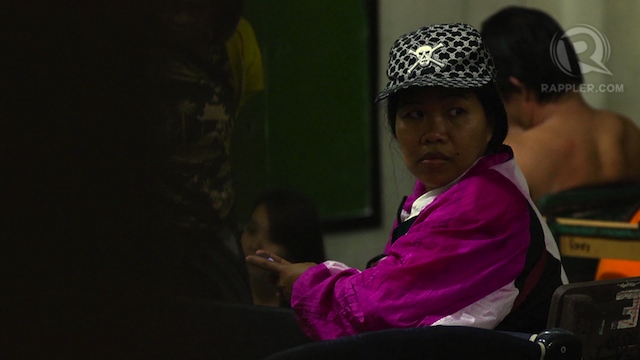SUMMARY
This is AI generated summarization, which may have errors. For context, always refer to the full article.

MARIKINA CITY, Philippines – She arrived at noon the day Maring came, after the bells rang.
Now Virgie sits in a classroom with 11 other families in Tañong High School. She has been here before, in the week after Ondoy, for two weeks after last year’s monsoon, sat with mother-in-law and sisters-in-law on wooden chairs, women waiting for the husbands and sons and brothers who stayed behind to protect what they could of homes.
Her husband comes in. Virgie prepares a bowl of rice. There is no food yet. The donations have not arrived. The volunteers say packages should have arrived, but there is nothing yet.
The village of Provident sits at the edge of the Marikina River. To the north is A. Bonifacio Avenue; south, west, and east are bound by 9 feet of dike and crowned by a chain-link fence.
Provident is where small girls were found hanging like Christmas angels from bamboo trees, wrapped in streamers of trash. Babies were found dead in backyard gardens. Old men were discovered curled under church pews. A mother opened her living room door to find her son lying bloated on a couch. A girl came home from college and found her father on the sidewalk wrapped in a white sheet. An entire family of 7 was untangled from the rafters of their small house. Along the dike, a man covered in chocolate mud was found clinging to a clump of tree roots.
More than 400 died on Sept 26, 2009 – 15 in Provident Village. Their ghosts walk down the streets. It is a village of rusting two-story homes and broken wiring, where faded For Sale signs are set against windows flush against broken glass. Apartments are abandoned. Cars are left to rust. Homes that once sold for millions are on the market for a tenth of the price, with no takers.
There were bells on the day Ondoy punched through the Provident dike, almost 4 years ago today. Virgie lives here. She heard the bells that day, her whole family did. They were told to evacuate, but they had seen storms before, and were not afraid.
Now Virgie is afraid of rain, and of days when the sky turns the color of smoke. She has lived here for years ever since she married a plumber and came home to his family. She ran with her family to a neighbor’s third floor apartment, clutching her baby and her husband’s hand, and watched as a surge of floodwater ripped the roof off her next-door house. She prayed, that day. At 3 in the afternoon of the next day, she went down to watch as rescuers lifted bodies wrapped in black plastic bags.
She learned a new word that day. Trauma. It is a word she uses now, and often. It is a verb and a noun and an adjective. Trauma for the children. Trauma for her. Trauma of the weeks she was forced to live in an evacuation center knowing that nothing was left. We were left with zero, she says. Nothing, nothing was left.
If Virgie had her way, she would not be living in Provident. They would go home to Iloilo, where she is from. Her husband refuses, says there is no work outside of the city, says it is better to be surrounded by family. He will not let her leave with the children, it is too expensive to keep two households. Virgie knows better. There are no floods in Iloilo. There is no money, true, but there isn’t much in Marikina either, and there, at the very worst, there is food in the fields.
Now there is only enough money for a few days, maybe a week, until the next payday. The other husbands arrive. They walk the school’s third floor hallways, smoking secret cigarettes, bouncing babies, watching the rain. At the worst of this week’s storm, there were 75 families living in the high school, almost 400 people with clothes hanging from jalousies and stuffed inside black garbage bags. They are poor, most of them. The richer of Provident have found friends and hotels, the poorer cook rice in pots.
The wind is still rising, and so is the water. Fourteen, 15, 16, 17 inches in the river outside of the dike. Virgie can hear the bells from the school. The water is rising. The sky is the color of smoke.
Virgie has learned to live with it, but she is still afraid. – Rappler.com
Add a comment
How does this make you feel?
There are no comments yet. Add your comment to start the conversation.